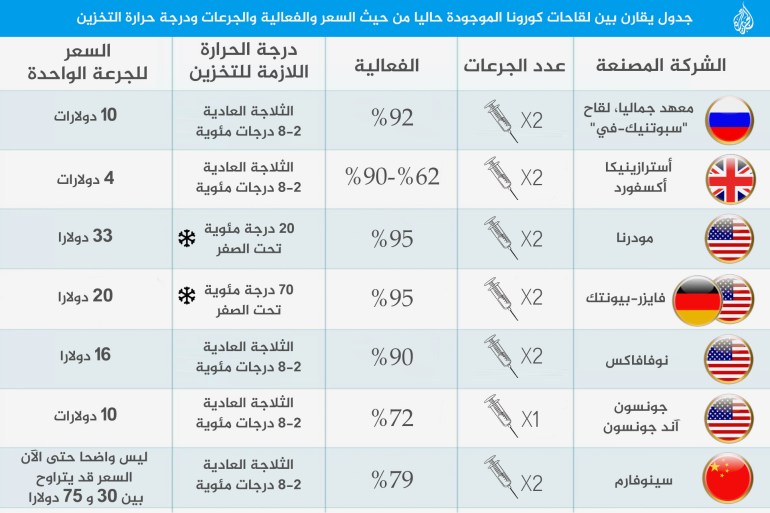Posts circulating on social media show a magnet that is attracted to the bodies of people, who say they have received the emerging coronavirus (Covid-19) vaccine, so what is the validity of these allegations?
According to these videos, “the magnet’s attraction to the body of the alleged recipient of the vaccine is a result of materials in the Corona vaccine that entered the body with the injection of the vaccine,” or the result of a “microchip” that is injected with the vaccine into the body.
How did the scientists respond?
Professor Michael Coy of Trinity College Dublin, in a statement to Reuters, described the allegations as "complete nonsense," as Gord told Reuters by e-mail:
That you would need one gram of iron to attract and support a permanent magnet on the side of the injection, something that would "feel easy" if it was present.
He added, "By the way, my wife was injected with her second dose of the" Pfizer "vaccine today, and she had an injection for more than two weeks. I have verified that the magnet is not attracted to our arms!"
According to the "Associated Press", Corona virus vaccines authorized for use in emergency situations in the United States do not contain any aluminum.
AstraZeneca or Sputnik-V does not contain aluminum.
Some Chinese COVID-19 vaccines, as well as some vaccines used against other diseases, use small amounts of aluminum to help boost the immune response.
This method is safe and the amount of aluminum is very little compared to what humans encounter elsewhere in daily life, experts say, according to the Associated Press.
Reuters quoted researchers from the University of Oxford - about aluminum in some vaccines - as saying that it is not more harmful than the minimum quantities found naturally in almost all foods and drinking water.
Even if the Covid-19 vaccines contain metals, they will not cause a magnetic interaction. Reuters quoted the Meedan Health Desk as saying, "The amount of mineral that must be in a vaccine in order to attract a magnet is much greater than the quantities that can be." To be present in a small dose of the vaccine. "
In an article in Forbes magazine, Bruce Y Lee, a professor and expert in computational and digital health, denied allegations that the Corona vaccine contains a chip that attracts a magnet.
Angelo Vechera wrote on the factcheck site that the false claim that vaccines contain microchips is receiving renewed attention through a series of videos of people claiming that magnets stick to their arms after vaccination.
But experts say none of the ingredients will cause this supposed effect.
Fine chips
Vichera added that there is nothing to support the false claim that vaccines contain "microchips", or ingredients that would lead to such a magnetic effect.
Lisa Morrissey, an assistant professor at Tulane University's School of Medicine who studies vaccines, confirmed in an email to FactCheck that the ingredients in "messenger RNA" and "adenoviruses" vaccines are simply "DNA". DNA and RNA, fats, proteins, salts, and sugars are all found in many foods, vaccines, and medicines.
"The microchip is of course a myth spread on social media," Morrissey added.
The term "micro" refers to the chip size which is equivalent to "micrometres" in size;
That is, "one millionth of a meter" (1 x 10⁻⁶ meter).
Whereas, the mRNA and adenovirus vaccines are nanoparticles;
This means nanometers, meaning "a billionth of a meter" (1 x 10−9 meter), so vaccines are a thousand times smaller than a microchip, and the microchip cannot be inserted into the vaccine.
"There is nothing the magnet can interact with. It is the proteins, fats, salts, water and chemicals that maintain the pH, so this is not possible," Thomas Hope, a researcher in the field of vaccines at Northwestern University, told AFP.
Angela Rasmussen, a virologist at Georgetown University, said that the claim that "Covid-19" vaccines can cause magnetic reactions is unfounded, in a statement to USA TODAY.
"This is very ridiculous. The vaccines do not attract your arm, it seems that the person in the video has attached the magnet to his arm (for example due to sweating)," she added.
Can a magnet interact with the human body?
The answer is yes, as Reuters quoted the Maiden Health Bureau as saying that all humans are naturally "slightly magnetic."
Because they contain trace amounts of iron.
However, the combination of iron and water in the body may cause the "repels" of the magnet to be very slight, and this function is the basis of the "magnetic resonance imaging" (MRI) scans that allow doctors to evaluate the body's organs in the hospital.
However, in conclusion, it was claimed that Corona vaccines contain magnetic materials, microchips, or iron that attract magnets. he lied.

